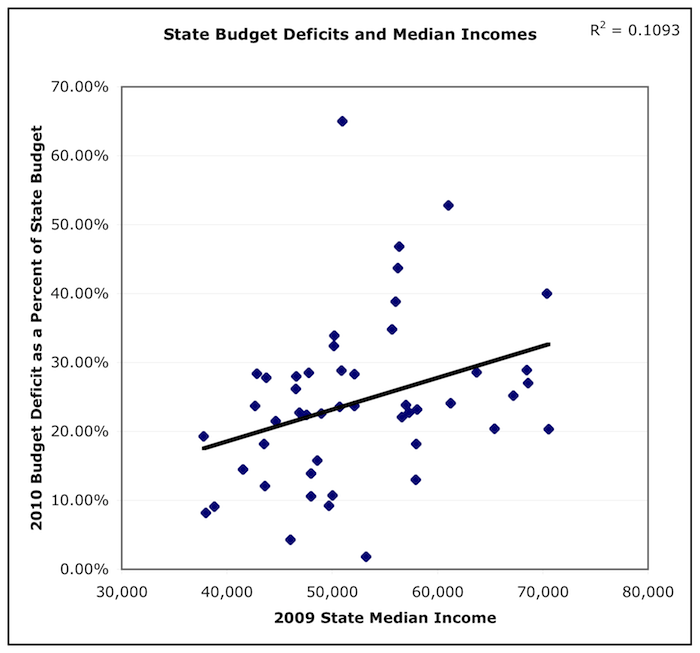Hooray. My friend Steve responded to my challenge. He posted some useless, misrepresentative data from the Wall Street Journal the other day, “showing” that blue states have bigger budget deficits, and suggesting that it’s “obviously” because of those blue-state policies.
Once he’d abandoned the New-York-has-a-bigger-deficit-[in-dollars]-than-Arkansas argument, he reverted to (in my words): “New York and California have big budget deficits. Their policies are the bluest of the blue. It’s obvious.”
I, of course, said, “show me the numbers,” because I simply had no idea whether he was right, and I’m always curious.
After pointing out that arguments agreeing with him “litter the Web” (they all go back to the same fact-free “source”; doesn’t he know better than to believe everything he reads on the interwebs [or hears on Fox News]?), he did:
Scatterplot below. As expected, it depicts a noticeable relationship. XLS file here.
Definitely a correlation there: .32. Pretty large by social-science standards. It makes you — or at least me — wonder if his causal narrative makes sense (again my words): “Blue” policies cause governments to spend too much, and exceed their means. It’s not a crazy narrative; I think it has some truth to it. (Though nowhere near as much as he thinks.)
As he points out, there are similar correlation levels out there that support some implied (and to some, “obvious”) causal narratives:
“…family income is correlated +.30 with the IQ of children…â€
“…meta-analysis obtained a corrected correlation of .32 between socioeconomic status and academic performance… â€
It got me curious again some more, so I started checking out some other independent variables (those presumed “causes”). State tax burdens don’t correlate much with 2010 budget deficits, though somewhat curiously, the small correlation that does exist (for what it’s worth) says higher taxes = higher deficits. Interesting, but not very.
An amusing one, from the correlation ≠causation ≠policy prescriptions school of argument:
Correlation? .33. There’s the answer! Just reduce everyone’s income and we’ll have smaller budget deficits! (No, I’m not using that as any kind of argument against Steve’s findings. It’s specious. But still.)
But then I thought to myself, what’s the “obvious” (to everyone), #1 cause of economic problems in our country right now? The mortgage meltdown of course:
Correlation: .55. The causal mechanism (large declines in real estate values result in large declines in state revenues) isn’t hard to find. That one we could call “obvious.”
Now I could make the specious and superficial, quite obviously falsely false rhetorical comment, “Voting for Obama obviously causes foreclosures.” But that evades the best argument (which is what I’m always looking for): maybe something about “blue” policies created a situation that resulted in more foreclosures (and and/or hence bigger budget deficits). Is there a causal mechanism at work? (We know that the small correlation between smoking and lung cancer implies causation because we understand the causal narrative: the molecular mechanisms that are at work.) I can think of some causal narratives that seem reasonable on the surface, and I’m sure Steve can too.
But at this point it seems to me that we’re facing Manzi’s problem of “causal density.” Especially given Steve and my relative lack of knowledge and expertise about the mortgage market, there are simply too many factors at play to give any of those surmises much credence.
I, for instance, have no idea how much control states have over lending standards. (Ten seconds of googling later, I now know more. Answer, not much. American Bankers’ Association: “it is critical that any new predatory lending law does not alter the current regulatory structure by making federally chartered institutions subject to state regulation.”)
So where does that leave me? I’m somewhat more convinced that blue policies can result in larger state budget deficits in recessions. But based on the info here, I haven’t learned anything about which policies do that causing. Voting for Obama “obviously” isn’t the cause. So what is?
The spreadsheet with data sources is here.



Comments
4 responses to “Did Democrats’ Policies Create Big State Budget Deficits?”
What you have basically is a clustered cloud with outliers.
Drop S. Dak, Neb, and Wyo, and the correlation for Obama vote vs deficit gap drops to 0.19.
Looking for a state govt. policy cause strikes me as being largely specious.
Beyond the mortgage situation, what other factors affect state budget shortfalls. How about federal infusions?
And when 50 out out 50 states are running deficits, is it the right time to be making these kinds of judgments?
Cheers!
JzB
@jazzbumpa
Those don’t look like outliers to me. Seems like just dumping points from the sample to change the results…
I don’t think it’s crazy to suggest that state policies could have resulted in greater or smaller recession deficits. Though of course other factors — yeah, federal transfers, and demographics, of course — could be much bigger factors.
Otherwise, I’m with ya.
Er, ah don’t forget that I omitted two Red states who had surpluses. I am being generous. The correlation is actually greater than .32. Feel free to read my post. No doubt there are lots of factors that correlate to deficits, but shouldn’t all progressives have expected a diffuse cloud with zero correlation? We’re far from that. This can’t be ignored. It’s no proof of causality, but sheesh…
Huh? Why would there be a zero correlation? We’ve long known that large urban populations vote Democrat. The largest housing bubbles were in big cities and other places where people actually want to live. Wow, shocking there was no housing bubble in Buttf*ck, Mississipi or Marriedcousins, Alabama so they’re not suffering a deficit?